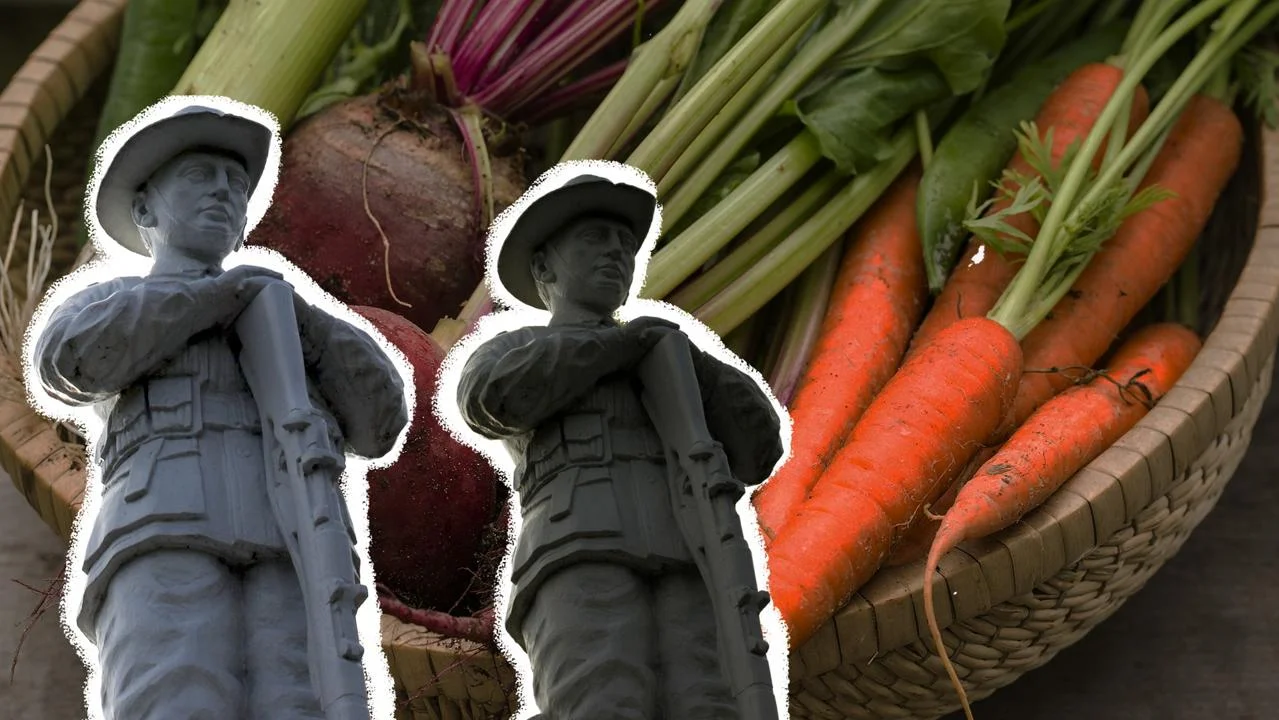Unearthing the allotment culture behind the front lines of the First World War

Contents
Have you taken up a new hobby during lockdown? Maybe you’re now a sourdough specialist or you’ve become a gardening extraordinaire – utilising that muddy patch in your yard or suntrap on your windowsill to produce homegrown veg.
If you have, you’re not alone. Research by the National Allotment Society shows applications for council-run allotments in England have spiked during the pandemic, with people craving a return to the land and a more sustainable lifestyle.
The sense of empowerment and meditation that gardening can bring during a crisis is nothing new. In fact, gardening can be so beneficial to our health, it was taken up by British troops behind the front line during the First World War.
"There is a sense of agency in nurturing a seed to plant in a world where we can’t do anything to solve the crisis going on outside our homes," explains LSE-based historian Dr Alex Mayhew.
Digging for victory
An expert in the cultural history of war, Dr Mayhew’s latest work explores identity and morale of English soldiers during the Great War. During his research, he uncovered the importance of gardening to British troops serving in the French Le Havre region. Here, the army set up and tended to allotments in areas of unused land around the camps.
What’s more, to encourage this cultivation of land, annual vegetable shows were organised by the British army in the region, giving soldiers an opportunity to display the fruits of their labour.
These shows were no small affair. Taking place between 14 and 16 August in both 1917 and 1918, they attracted thousands of British and Belgian troops, as well as French civilians - who lived nearby and were invited to display their produce at the shows. In 1917, there were 650 competition entries from British sources alone, going up to 830 entries in 1918.
You can’t survive trauma unless you find spaces to escape and I think this is a really vivid example of that.
Separate categories were set up for British and Belgian troops as well as French civilians (for unknown reasons French troops didn’t take part in the competition) with medals minted for all the winners. This cultivated a sense of friendly rivalry between the allies and fostered good relations with the local civilian community. Indeed, entry fees collected from the shows were divided up and donated to the French and British war funds.
Sense of escape
The shows also provided a source of entertainment with bands playing and refreshments on offer – reminiscent of the garden shows popular in pre-war Edwardian England and not an image you would normally associate with life behind battle lines.
"Recent analysis shows that soldiers probably actually spent no more than half of their time on the front line and that begs the question of what they were doing for the rest of the time," explains Dr Mayhew.
With military history traditionally focusing on life in the trenches, Dr Mayhew’s research offers new insight into the role of soldiers away from the sharp end of battle but still dealing with the trauma and dislocation of war.
"I found it surprising that even when fighting was at its fiercest and there were huge strains on the military as an institution, soldiers found the time and incentive to hold these shows, which took months to organise. Sometimes, when you look at an historical event, it’s easy to forget there were other things happening around it. You assume everyone was constantly preoccupied by war, but this is evidence that was simply not the case."
Dr Mayhew believes tending the allotments and organising the shows provided a way of coping with distress. "You can’t survive trauma unless you find spaces to escape and I think this is a really vivid example of that." Distracting ourselves and finding pockets of joy, is something we may all be able to identify with at the moment. Living through a pandemic, it’s no surprise many of us have taken up activities that give us a sense of agency in chaotic times.
Dr Mayhew sees this as a basic human reaction to crisis inherited from our ancestors. Even though there might be centuries between us, when we face difficult times, we react in the same way and there is a common thread of human experience we can trace throughout time.
This is a useful reminder for organisations more generally. Look at what your employees are already doing and see if it’s something you can build upon to improve performance.
Green grass of home
Beyond providing a sense of escape, research shows the allotments were an important food source for the British army. Indeed, they had been promoted as an important tool for alleviating poverty in Britain since the nineteenth century.
Popular vegetables cultivated onsite included everything from potatoes, cabbages and kale to carrots, pumpkins and marrows. And following the success of the first vegetable show in 1917, the second show in 1918 was expanded to include husbandry and the presentation of birds and rabbits.
Dr Mayhew believes the vegetable shows, along with other activities enjoyed by soldiers at the time - such as sports games and dances - tapped into popular culture. In doing so, they created nostalgic memories of home, giving soldiers hope for the future and boosting their morale.
"Lots of activities amongst soldiers such as playing sport and gardening started organically and rose from the bottom-up. When the army realised how important these activities were for building morale, they institutionalised them," says Dr Mayhew. "In fact, this is a useful reminder for organisations more generally. Look at what your employees are already doing and see if it’s something you can build upon to improve performance."
Throughout the last year, numerous comparisons have been drawn between the current pandemic and the war period and this research offers rich insight into the lessons we can learn from our forebears on how to cope with ongoing trauma and understand our reactions to it, if we dig below the surface.
Dr Alex Mayhew was speaking to Charlotte Kelloway, Media Relations Manager at LSE.
Download a PDF version of this article




